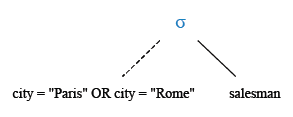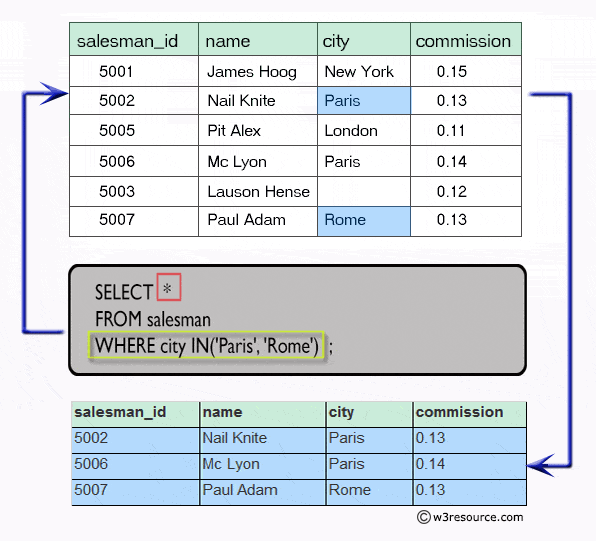SQL Exercises: Filter records using in operator
2. Salespeople in Paris or Rome
From the following table, write a SQL query to find the details of the salespeople who come from either 'Paris' or 'Rome'. Return salesman_id, name, city, commission.
Sample table: salesman
salesman_id | name | city | commission
-------------+------------+----------+------------
5001 | James Hoog | New York | 0.15
5002 | Nail Knite | Paris | 0.13
5005 | Pit Alex | London | 0.11
5006 | Mc Lyon | Paris | 0.14
5007 | Paul Adam | Rome | 0.13
5003 | Lauson Hen | San Jose | 0.12
Sample Solution:
-- This query selects all columns from the 'salesman' table.
SELECT *
-- Specifies the table from which to retrieve the data (in this case, 'salesman').
FROM salesman
-- Filters the rows to only include those where the 'city' column has the value 'Paris' or 'Rome'.
WHERE city = 'Paris' OR city = 'Rome';
Output of the Query:
salesman_id name city commission 5002 Nail Knite Paris 0.13 5006 Mc Lyon Paris 0.14 5007 Paul Adam Rome 0.13
Code Explanation:
The above SQL query that selects all columns (*) from the table called 'salesman' where the city is in the list of values ('Paris','Rome').
It will return all rows from the 'salesman' table where the city column has a value of 'Paris' or 'Rome'.
The IN operator is used here instead of multiple OR conditions to check for multiple values in the same column.
Relational Algebra Expression:
Relational Algebra Tree:
Explanation:
Visual presentation:
Go to:
PREV : Salespeople from Paris or Rome.
NEXT : Salespeople Not in Paris or Rome.
Practice Online
For more Practice: Solve these Related Problems:
- Write a SQL query to find the details of salespeople who live in 'San Jose' or 'London'. Return salesman_id, name, city, commission.
- Write a SQL query to retrieve the details of salespeople whose city ends with the letter 'e'. Return salesman_id, name, city, commission.
- Write a SQL query to find the details of salespeople who do not belong to 'Paris' or 'Rome'. Return salesman_id, name, city, commission.
- Write a SQL query to list all salespeople whose city contains the letter 'o'. Return salesman_id, name, city, commission.
Contribute your code and comments through Disqus.
What is the difficulty level of this exercise?
Test your Programming skills with w3resource's quiz.



